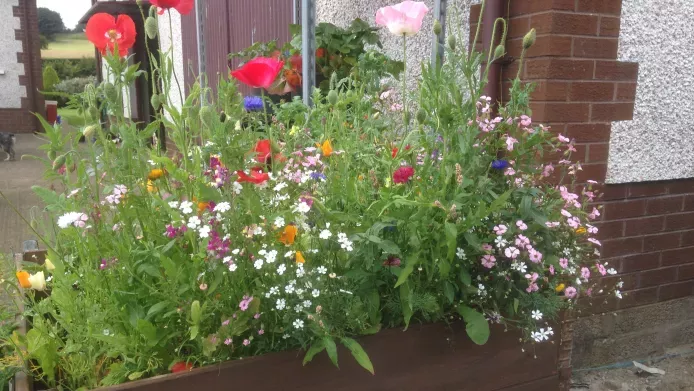There are a whole host of benefits to be gleaned through connecting with nature.
Getting outside, digging, walking, drawing, or identifying the plants and fungi we see can all have a positive impact on our wellbeing.
Research has shown that spending time in nature can have a positive effect on our mental health, whether it's a long walk in the mountains or a simple stroll around your local park or green space. Plus, it brings some all-important fresh air and exercise into the bargain.
Read more about nature and mental health.
Take a look at the activities, blog posts and information below to find out how you can connect with nature and improve your wellbeing.

Boost your mood
Feeling on edge? Frazzled at work? Overloaded by technology? Studies from the University of Exeter Medical School have revealed a correlation between mental wellbeing and the amount of green space in the local area.
People feel happier and more positive when they have access to parks and gardens, while heavily built-up urban areas pose a threat to mental health. Green spaces also have the possibility to reduce antisocial behaviour and incidence of crime in urban areas. So what can urbanites do to get closer to nature?
Try sowing wildflower seeds in pots or containers on a porch, balcony or windowsill – you don’t need much space! Or why not get involved with a local community project?
Did you know?
Kew scientists are currently researching 'nature connectedness' as part of their goal to provide scientific evidence for nature-based solutions, and are looking into how enhancing biodiversity impacts people’s wellbeing.

Healthy lifestyle
Forget the treadmill and the cross-trainer. You may not get a complimentary fluffy towel and your own locker, but getting stuck into green tasks like digging, weeding and mowing is on a par, physically, with visiting a conventional gym. It’s also a lot cheaper!
Plus, time outside on a sunny day should give you a healthy boost of vitamin D. And sunshine boosts serotonin – the body’s natural happy hormone – so getting out in the sun occasionally makes us feel happier and more energetic. Just don't forget the sunscreen!
Learning how to nurture and grow plants also has an influence on your wider lifestyle patterns – studies show that green-fingered folk are more likely to have healthier diets and to eat more fruit and veg than their peers.
The Brunswick Hub, a mental health and wellbeing centre in Leamington Spa, received a Grow Wild wildflower seed kit in summer 2020 and used it to develop their community garden, with the help of volunteers.
Wellbeing Officer Theresa said: ‘More people have been using the space since we reopened – even coming just to take five minutes in it, as it’s such a beautiful area to be in.
Members of our regular groups have also become involved in the actual gardening as well, which has its own wellbeing benefits! We’re already sourcing seeds and plants ready for spring next year. We have a dementia group, and so I’m really hoping we can get out there in spring to paint pots and enjoy the other activities in the garden itself.
Many of the visitors to our garden don’t have access to green space where they live, so when COVID-19 first hit the UK, even very early on, people were able to come to the garden for their daily exercise and enjoy the space. It’s been a bit of a lifeline for people.’

Get social
Pitching in with a local growing project or fungus group can bring brilliant social benefits, for individuals and wider community.
Socialising and contributing to group action not only makes people feel more confident about themselves, but also has a positive effect on physical wellbeing.
Building bonds across generations and economic and demographic barriers can stave off feelings of loneliness – creating strong and healthy communities.
If you can’t find a suitable in-person project to get involved with, there are plenty of ways to socialise virtually and share a passion for plants. Whether you’re a complete newbie or a seasoned gardener, you’re welcome to join Grow Wild’s Facebook groups for fungus- and wildflower-growers, where we hope you’ll connect with some like-minded, green-fingered folk!
Skill up
It’s never too late to learn something new, and getting involved with Grow Wild could really help to enhance your skill set. Community growing projects often involve a host of life-enhancing skills including design, DIY, team work and communication – not to mention useful, seasonal gardening skills.
Plus, learning more about our UK native wildflowers and fungi will help you to feel more connected to the nature you see around you.
Nature activities
Get outside, have fun and learn about wildflowers and fungi with our activities and identification guides
